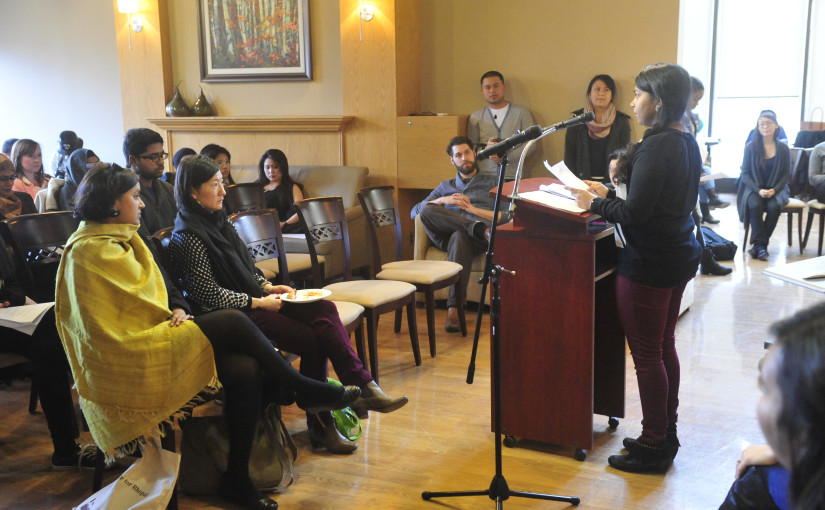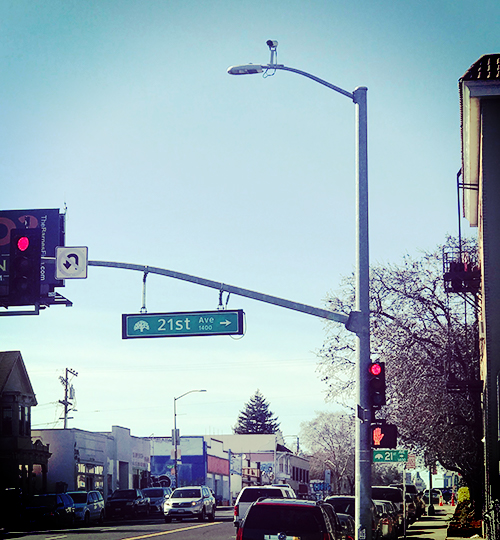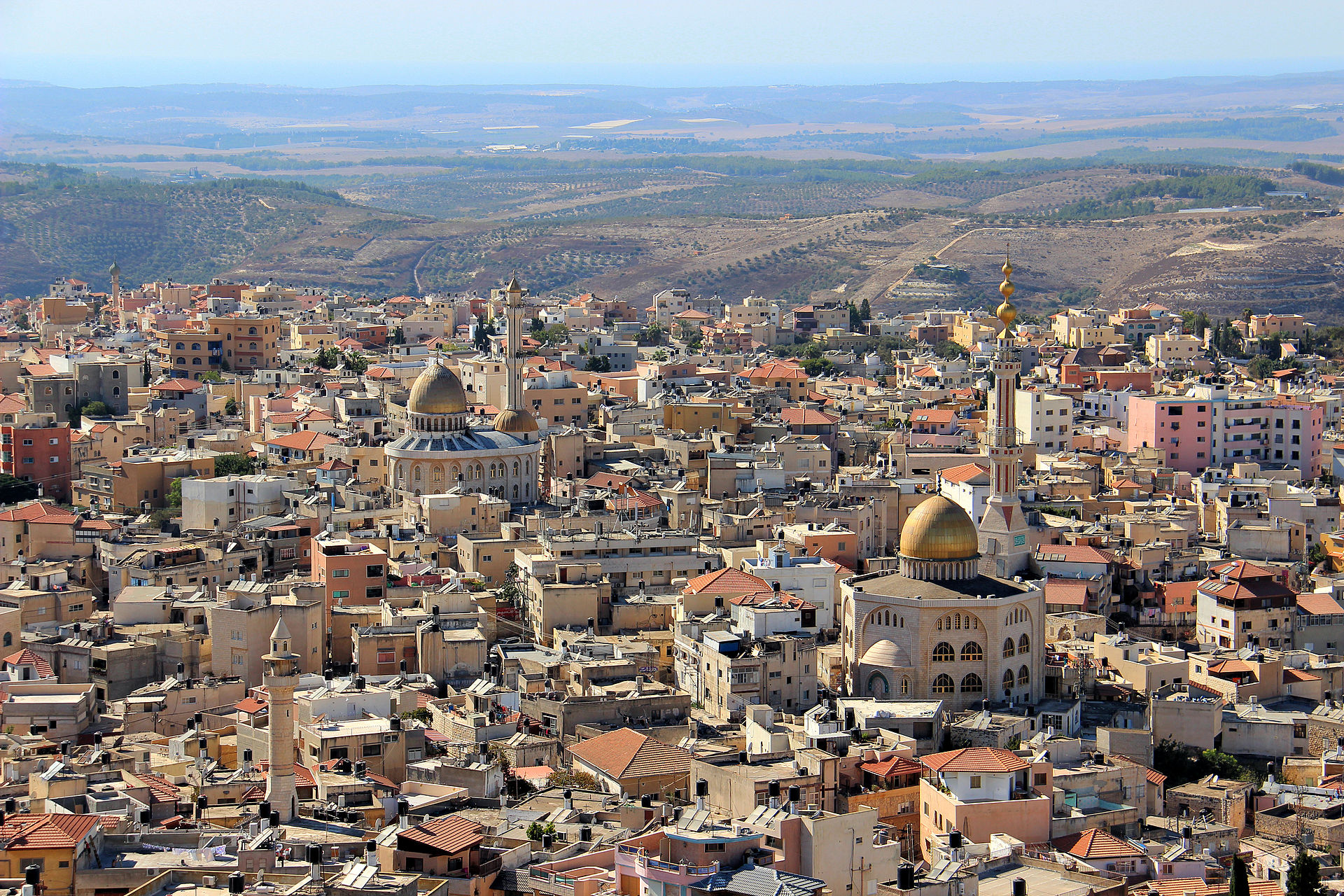By Shiromi Santhakumar
Published on December 8, 2014
[caption id="attachment_710" align="aligncenter" width="600"] Sri Lanka. Image submitted by Shiromi Santhakumar.[/caption]
In July 2004, my mother, sister, brother and I prepared for our departure from Sri Lanka. We packed the brand new clothes we purchased from the well-known stores in Colombo along with the dried fish we purchased from the local fishery.
Eleven years old at the time, I was going across the globe to reunite with my father after three years. Despite the excitement, I worried about what I was leaving behind in Sri Lanka. We said our farewells, and rode in the rented van to the airport.
Walking towards the boarding zone, we were ordered to line up at the security checkup. As I took off my shoes, I remember noticing that most people there had the familiar faces of people of Sri Lankan and Indian descent. Probably not so in Canada. I thought about how my life would change.
Air Canada was unlike the Sri Lankan Airline. The flight attendant did not speak Tamil or Sinhalese, but spoke in English and French. The passengers were diverse; I saw many people who were white, black, or Asian. I wondered how these people communicated with each other. Were they born in Canada? Did they immigrate like me? How will I learn French?
Sri Lanka. Image submitted by Shiromi Santhakumar.[/caption]
In July 2004, my mother, sister, brother and I prepared for our departure from Sri Lanka. We packed the brand new clothes we purchased from the well-known stores in Colombo along with the dried fish we purchased from the local fishery.
Eleven years old at the time, I was going across the globe to reunite with my father after three years. Despite the excitement, I worried about what I was leaving behind in Sri Lanka. We said our farewells, and rode in the rented van to the airport.
Walking towards the boarding zone, we were ordered to line up at the security checkup. As I took off my shoes, I remember noticing that most people there had the familiar faces of people of Sri Lankan and Indian descent. Probably not so in Canada. I thought about how my life would change.
Air Canada was unlike the Sri Lankan Airline. The flight attendant did not speak Tamil or Sinhalese, but spoke in English and French. The passengers were diverse; I saw many people who were white, black, or Asian. I wondered how these people communicated with each other. Were they born in Canada? Did they immigrate like me? How will I learn French?
* * *
Holding my hand tightly, my mother hurried towards our next flight boarding area, with my siblings following behind. I remember the people in Germany seemed hostile. The airport security was solemn and intimidating. The white travelers ignored my family’s presence and did not return my smiles. [caption id="attachment_709" align="aligncenter" width="600"] Airplane Seat. Image submitted by Shiromi Santhakumar.[/caption]
The next Air Canada flight was much larger. Each seat had a personal television, just like the business class seats on Sri Lankan airlines. Struggling to stow my heavy carry-on, I was grateful when a stranger’s hand reached over and helped me. A white woman about my mother’s age smiled at me warmly and sat in the empty seat beside me.
As we floated above the clouds, I gained a new kind of confidence and managed to start a conversation with her. She was so kind. She helped me pick food and asked questions about me. I had thought that white people were cold, only interacted with other white people, and looked down on others like me. Not this woman. I was wrong.
As the plane got ready to land, I dared to peek outside the window. I remember seeing the brightly lit building through the darkness.
We cleared the efficient immigration line, collected our luggage, and made our way through the entrance leading into the waiting area. I saw a large group of familiar faces. My father, uncles, aunts and cousins all waited for us.
I ran to my father first. He said, “Welcome to Canada! You’re going to love it here!”
As I stepped out and into the cold grass, memories of Sri Lanka rose up. Canada is my home now. When will I make myself at home here?
Airplane Seat. Image submitted by Shiromi Santhakumar.[/caption]
The next Air Canada flight was much larger. Each seat had a personal television, just like the business class seats on Sri Lankan airlines. Struggling to stow my heavy carry-on, I was grateful when a stranger’s hand reached over and helped me. A white woman about my mother’s age smiled at me warmly and sat in the empty seat beside me.
As we floated above the clouds, I gained a new kind of confidence and managed to start a conversation with her. She was so kind. She helped me pick food and asked questions about me. I had thought that white people were cold, only interacted with other white people, and looked down on others like me. Not this woman. I was wrong.
As the plane got ready to land, I dared to peek outside the window. I remember seeing the brightly lit building through the darkness.
We cleared the efficient immigration line, collected our luggage, and made our way through the entrance leading into the waiting area. I saw a large group of familiar faces. My father, uncles, aunts and cousins all waited for us.
I ran to my father first. He said, “Welcome to Canada! You’re going to love it here!”
As I stepped out and into the cold grass, memories of Sri Lanka rose up. Canada is my home now. When will I make myself at home here?
* * *
[caption id="attachment_1283" align="aligncenter" width="825"] Shiromi presenting her story at the Second Annual Reading of On the Move in April 2014.[/caption]
Further reading and viewing suggestions
Shiromi presenting her story at the Second Annual Reading of On the Move in April 2014.[/caption]
Further reading and viewing suggestions
- Abeysiriwardena, Duminda. 2014. “Wadi Karawala Hodda (Dry Fish Curry).” Cook With Chef Duminda.
- Khanlou, Nazilla, Yogendra B. Shakya, Farah Islam, and Emma Oudeh. 2014. “Newcomer Youth Self-Esteem: A Community-Based Mixed Methods Study of Afghan, Columbian, Sudanese and Tamil Youth in Toronto, Canada.” In Refuge and Resilience, edited by Laura Simich and Lisa Andermann, 109–29. International Perspectives on Migration 7. Springer Netherlands.
- Krishnamurti, Sailaja. 2012. “Queue-Jumpers, Terrorists, Breeders: Representations of Tamil Migrants in Canadian Popular Media.” South Asian Diaspora 5 (1): 139–57.
- Tim Hortons. 2010. “Tim Hortons Coffee Commercial Welcome Home.” YouTube video, 1:00.



From your story, I can tell that this experience was very exciting but very nerve-racking at the same time. Leaving a place you called home for eleven years for a country that has a very different culture, is definitely not an easy process. Reading your story reminded me about my immigration process to Canada ten years ago. Like you, I was fortunate enough to have my mom already living in Canada prior to my arrival. It definitely made the transition a lot easier for me. I enjoyed reading your story very much.
How do you make a foreign country your home? When migrating to another country certain notions will flood your mind. Will I lose who I was before I entered this country? Will I assimilate into their idea of a ‘citizen’. Culture is an action, so to speak, where you collectively acquire certain knowledge that will fundamentally help you to become mutual with your ‘environment’. If culture is what we do; which culture will I continue to familiarize with. The culture I familiarized with when I was in my native country or will I come to familiarize with the culture of my ‘new home’. Will it be like the saying… “When in Rome, do as the Romans do”.
The cultural shock when moving from one country to another and making it your home is a challenge. I was born in Canada and had to migrate to Jordan when I was 14 due to a job opportunity my father got. Your story reminds me of all the feelings and thoughts I had when I was leaving Canada. Although I am of Arab decent, and my parents grew up in Jordan, I was never able to call Jordan my home. Moving countries and trying to make it your home gives you firsthand experience on the vast cultural differences that exist across space.
Your story demonstrate the excitement and confusion that accompanies new sights and sounds that one might experience when moving from one country to another. The endless questions of what this new place will be like, what kind of living conditions will you be in, and what kind of different people you will encounter stays on top our minds. Emigrating from one country to another brings a sense of hope and opportunities to our parents or guardians, but to us or any other young people, we experience it in a much more unnerving perspective of the unknown and what lies ahead as soon as the plane lands.
After reading your story, I felt deeply touched and had very similar feelings. Just like you, I immigrated to Canada five years ago. Before I came, I had a million questions and doubts, How is the new country? Will it be my new home? Just like Yi-Fu Tuan said, sense of place could also be negative such as fear, and this sense of place challenged every new comers. However, I came with hope and positive mind, which made it easier to accustom to new life. Once I became familiar with the new culture and new tradition, here became my second home.
As an immigrant to Canada myself, I can identify with your feelings completely. I had much the same experience when I first came to Canada, the same sense of excitement mixed with worry about what to expect. The moment I left China, I felt out of place because I wasn’t sure how to behave, what to do, what to say, etc. Like you, I was surrounded by people who were different from me, people from different ethnic groups. But, as you said, that feeling gradually disappeared and I warmed up to my new surroundings with the help of other Canadians.